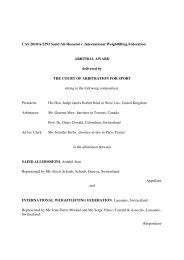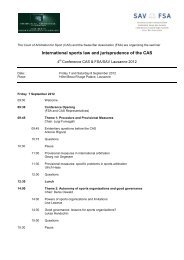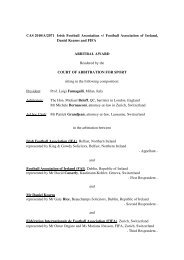(CAS) Bulletin - Tribunal Arbitral du Sport / TAS
(CAS) Bulletin - Tribunal Arbitral du Sport / TAS
(CAS) Bulletin - Tribunal Arbitral du Sport / TAS
You also want an ePaper? Increase the reach of your titles
YUMPU automatically turns print PDFs into web optimized ePapers that Google loves.
ody as a result of eating a piece of contaminated<br />
meat (without the Athlete knowing that the meat was<br />
contaminated).<br />
Although arguing that under the UCI ADR they<br />
are under no <strong>du</strong>ty to establish how the Prohibited<br />
Substance entered the Athlete’s body, the Appellants<br />
nevertheless decided to put forward alternative<br />
theories as to the possible sources of the Prohibited<br />
Substance and to try and establish that those sources<br />
were more likely to be the reason for the presence of<br />
the Prohibited Substance in the Athlete’s system than<br />
the ingestion of allegedly contaminated meat.<br />
Therefore, the Panel will begin by examining how<br />
the term “balance of probability” shall be interpreted<br />
and how the framework regarding the burden and<br />
standard of proof is to be applied in a case in which<br />
the Appellants do not limit themselves to arguing<br />
that the Respondent has failed to establish the reality<br />
of his own contentions regarding how the Prohibited<br />
Substance entered his body. As these various issues<br />
are closely related, they will be dealt with together.<br />
3.1 UCI<br />
In its appeal brief of 18 April 2011, the UCI alleges<br />
that it is neither the burden of the UCI to suggest<br />
possible routes of ingestion, nor to show how likely<br />
any of the possible routes of ingestion might be. To<br />
the contrary, it is the burden of Mr Contador to show<br />
that his thesis of meat contamination is correct, or at<br />
least, that 1) his thesis of meat contamination is more<br />
likely than any other possible route of ingestion;<br />
and 2) meat contamination is more likely to have<br />
occurred than not to have occurred. Therefore, the<br />
UCI does not have the burden to show that another<br />
possible route of ingestion exists and is more likely<br />
than the route proposed by Mr Contador (meat<br />
contamination).<br />
According to the UCI, meeting the standard of the<br />
balance of probability means that it is established that<br />
something is more likely to have happened than not to<br />
have happened. For the purpose of having the period<br />
of ineligibility eliminated under Article 296 UCI<br />
ADR or re<strong>du</strong>ced under Article 297 UCI ADR, Mr<br />
Contador puts forward one single possibility as the<br />
route of ingestion. The circumstance that such route<br />
of ingestion is materially possible and can explain<br />
as such the presence of clenbuterol is not enough<br />
to satisfy the standard of balance of probability; Mr<br />
Contador has to show that this possible route of<br />
ingestion is more likely to have happened than not to<br />
have happened.<br />
Where various possible routes of ingestion exist, the<br />
circumstances of the particular case will provide<br />
indications for the greater or lesser degree of likelihood<br />
of each of them. The result of the assessment and<br />
comparison of the degree of likelihood of each of the<br />
possible routes of ingestion may be that one of these<br />
possible routes of ingestion is accepted as being more<br />
likely than any of the other possibilities.<br />
However, the burden of proof that is on Mr Contador<br />
is not met by merely alleging and invoking evidence<br />
that a given route of ingestion occurred; in addition<br />
to that he has to show that this contended route of<br />
ingestion, as such, is more likely to have occurred<br />
than not to have occurred. It is in this way the UCI<br />
understands § 5.9 of <strong>CAS</strong> 2009/A/1930.<br />
“ In view of these provisions, it is the Panel’s understanding<br />
that, in case it is offered several alternative explanations for<br />
the ingestion of the prohibited substance, but it is satisfi ed that<br />
one of them is more likely than not to have occurred, the Player<br />
has met the required standard of proof regarding the means of<br />
ingestion of the prohibited substance. In that case, it remains<br />
irrelevant that there may also be other possibilities of ingestion,<br />
as long as they are considered by the Panel to be less likely to<br />
have occurred. In other words, for the Panel to be satisfi ed that<br />
a means of ingestion is demonstrated on a balance of probability<br />
simply means, in percentage terms, that it is satisfi ed that there<br />
is a 51% chance of it having occurred. The Player thus needs to<br />
show that one specifi c way of ingestion is marginally more likely<br />
than not to have occurred ”.<br />
3.2 WADA<br />
WADA alleges in its appeal brief of 18 April 2011<br />
that the balance of probability standard entails that<br />
the athlete has the burden of convincing the Panel<br />
that the occurrence of the circumstances on which<br />
the athlete relies is more probable than their nonoccurrence.<br />
WADA also refers to § 5.9 of <strong>CAS</strong><br />
2009/A/1930.<br />
According to WADA, the fi rst instance body did not<br />
apply this test correctly and erred as it considered, in<br />
essence, that the food contamination was established<br />
because no contrary explanation was supposedly<br />
proven. The fi rst instance body placed de facto the<br />
burden of proof upon the anti-doping organisation<br />
instead of upon the athlete; the assumption of food<br />
contamination alleged by Mr Contador was accepted<br />
because it was not excluded by other evidence. Such<br />
reasoning is contrary to the balance of probability<br />
test: the question is not to know if the theory of the<br />
athlete can be excluded, but rather to determine if it<br />
is more likely than not that the alleged scenario has<br />
occurred.<br />
Jurisprudence majeure / Leading cases<br />
-<br />
111





